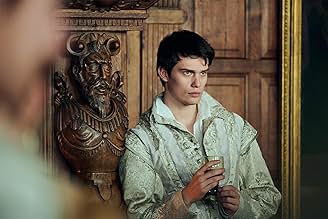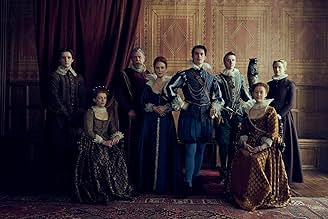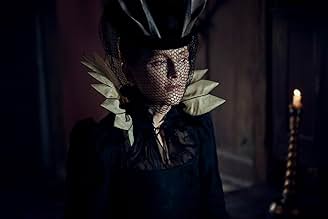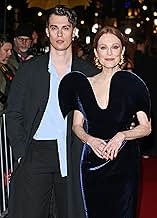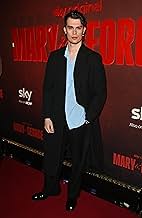Mary & George
- Mini-série télévisée
- 2024
- 1h
Ajouter une intrigue dans votre langueThe Countess of Buckingham molds her son to seduce King James I and become his all-powerful lover through intrigue; to become richer, more titled and influential than England has ever seen.The Countess of Buckingham molds her son to seduce King James I and become his all-powerful lover through intrigue; to become richer, more titled and influential than England has ever seen.The Countess of Buckingham molds her son to seduce King James I and become his all-powerful lover through intrigue; to become richer, more titled and influential than England has ever seen.
- Nommé pour 1 prix Primetime Emmy
- 9 nominations au total
Parcourir les épisodes
Avis en vedette
This tale of England and Scotland's homosexual king James I and his favourite and lover, George Villiers, Duke of Buckingham, might look the part but there are too many aspects to it which can only deserve the well-known observation 'nice try, but no cigar'.
This series is like those tomatoes we are offered these days in the vegetable section of too many superstores: they look the part and are certainly pretty, but all too often they taste of very little but water, and mot certainly not of tomatoes.
That analogy is not as silly as it sounds: shop for tomatoes in a Southern European small-town market and you will be offered horribly misshapen specimens, but by God they taste great and do taste of tomato.
We spoiled shoppers, however, are put off aesthetically by such misshapen fruit and lazily settle for tasteless specimens which, however, look fantastic.
That pretty much sums up Mary & George: with its authentic looking sets (filmed in various Jacobean manor houses in England), sumptuous costumes and its cod-Shakespearean dialogue, many might feel Mary & George is the real deal.
But it is nothing of the kind: essentially it is bog-standard soap opera drama portentously puffed up to seem profound, whereas for too many reasons it is nothing but an expensively produced soap opera with pretensions it never lives up to.
The first, and perhaps most important, point to make is that it is fiction. This is not history. Other reviewers have warned that many watching this will imagine it is 'history' and I shall repeat that warning: this is pure fiction involving real historical characters.
Yes, James I was homosexual, and although he fathered eight children by his wife Anne of Denmark (of whom four died in infancy and his eldest son and heir died at 18) and thus might be classed as bisexual, he and Anne lived separate lives and his main inclination was gay.
He was quite open about his sexuality and did not stint himself in public with his gay courtiers. Modern apologists, in a curious form of homophobia, like to argue along the lines that 'we don't understand the kind of male friendships in the 16th and 17th centuries' and that his kind of behaviour was not necessarily gay.
Yes, it was, and James was often the butt of ribald jokes and ballads by what are often condescendingly called 'the lower orders', but he didn't care one jot.
However, the kind of rampant sexual behaviour depicted in Mary & George is fictional: James was very conscious of his 'royal status' - he 'was the king' and people had better believe it - and he would not have jeopardised his role in such a blatant public way.
It is also very probable that George Villiers was mainly gay, and he and James were known to have been very close, with a discrete passageway connecting his rooms to Villiers'. But the arrangement and goings-on set out in the TV series are occasionally ludicrous.
The novel upon which the series is based suggests that Villiers mother Mary patiently schemed to get her son, metaphorically, into James's bed. That scheming is demonstrated in the series, but all the machinations we are asked to believe are never convincing.
The evolution of George from something of a wimp into one of if not the most powerful man in England for a while is portrayed in such a cack-handed fashion that we can't quite bring ourselves to believe it (and thus as drama the piece falls at the first hurdle).
Other aspects of the series are also fatally flawed: we are presented with characters who speak, both in content and manner, in a pseudo-Jacobean fashion, but the writers also have them incessantly effing and blinding and using the C word like dockworkers. And it is incessant and even Mary does it.
It's as though the producers wanted 'an historical piece', but also wanted 'to make it modern'. That's about the only explanation I can give. It ends up being simply silly.
OK, this is fiction, but Francis Bacon would certainly not had wandered around the streets of London (though the same street is put to work several times as it happens) alone as he is shown to do.
Mary might well have had a lesbian relationship - why not, many women do. But it is a cliche too far to have her striking up such a relationship with a woman who was either a brothel madam or even just a simple prostitute. Mary was far too conscious of her status and she would not have ventured into a brothel on her own in the first place.
The vicissitudes of her rise to power are also so convoluted as at times to be more than a little incomprehensible. And would she really have, after being a scorned woman, so miraculously become such a power at court? Don't think so.
As for her supposed gay relationship (which is somewhat gratuitous as it serves no dramatic function at all), it is doubly unlikely in that in the Jacobean era and for the next two hundred years at least the class distinctions were not only vast but important to those at the top. There was no mingling 'with the plebs' by 'nobility'.
If a gay noble wanted a quick spot of how's our father, there were plenty of other gay nobles or palace staff to have it on with without trawling the streets. And it would not have taken place in one of the palace corridors.
It occurs to me that in the muddled thinking of the producers, what with rather a lot of flash-forwards and flash-backs and folk suddenly appearing, Mary & George was perhaps intended as some kind of 'art piece'. Well, it that was the case they get nul points.
At the end of the day one might argue that my gripes are irrelevant because, after all, this is 'only fiction'. To that I would respond 'fine, but overall what with this flaw and that anachronism - the constant use of the F and C words - it is rather badly made fiction.
It might look the part, but it does not convince.
This series is like those tomatoes we are offered these days in the vegetable section of too many superstores: they look the part and are certainly pretty, but all too often they taste of very little but water, and mot certainly not of tomatoes.
That analogy is not as silly as it sounds: shop for tomatoes in a Southern European small-town market and you will be offered horribly misshapen specimens, but by God they taste great and do taste of tomato.
We spoiled shoppers, however, are put off aesthetically by such misshapen fruit and lazily settle for tasteless specimens which, however, look fantastic.
That pretty much sums up Mary & George: with its authentic looking sets (filmed in various Jacobean manor houses in England), sumptuous costumes and its cod-Shakespearean dialogue, many might feel Mary & George is the real deal.
But it is nothing of the kind: essentially it is bog-standard soap opera drama portentously puffed up to seem profound, whereas for too many reasons it is nothing but an expensively produced soap opera with pretensions it never lives up to.
The first, and perhaps most important, point to make is that it is fiction. This is not history. Other reviewers have warned that many watching this will imagine it is 'history' and I shall repeat that warning: this is pure fiction involving real historical characters.
Yes, James I was homosexual, and although he fathered eight children by his wife Anne of Denmark (of whom four died in infancy and his eldest son and heir died at 18) and thus might be classed as bisexual, he and Anne lived separate lives and his main inclination was gay.
He was quite open about his sexuality and did not stint himself in public with his gay courtiers. Modern apologists, in a curious form of homophobia, like to argue along the lines that 'we don't understand the kind of male friendships in the 16th and 17th centuries' and that his kind of behaviour was not necessarily gay.
Yes, it was, and James was often the butt of ribald jokes and ballads by what are often condescendingly called 'the lower orders', but he didn't care one jot.
However, the kind of rampant sexual behaviour depicted in Mary & George is fictional: James was very conscious of his 'royal status' - he 'was the king' and people had better believe it - and he would not have jeopardised his role in such a blatant public way.
It is also very probable that George Villiers was mainly gay, and he and James were known to have been very close, with a discrete passageway connecting his rooms to Villiers'. But the arrangement and goings-on set out in the TV series are occasionally ludicrous.
The novel upon which the series is based suggests that Villiers mother Mary patiently schemed to get her son, metaphorically, into James's bed. That scheming is demonstrated in the series, but all the machinations we are asked to believe are never convincing.
The evolution of George from something of a wimp into one of if not the most powerful man in England for a while is portrayed in such a cack-handed fashion that we can't quite bring ourselves to believe it (and thus as drama the piece falls at the first hurdle).
Other aspects of the series are also fatally flawed: we are presented with characters who speak, both in content and manner, in a pseudo-Jacobean fashion, but the writers also have them incessantly effing and blinding and using the C word like dockworkers. And it is incessant and even Mary does it.
It's as though the producers wanted 'an historical piece', but also wanted 'to make it modern'. That's about the only explanation I can give. It ends up being simply silly.
OK, this is fiction, but Francis Bacon would certainly not had wandered around the streets of London (though the same street is put to work several times as it happens) alone as he is shown to do.
Mary might well have had a lesbian relationship - why not, many women do. But it is a cliche too far to have her striking up such a relationship with a woman who was either a brothel madam or even just a simple prostitute. Mary was far too conscious of her status and she would not have ventured into a brothel on her own in the first place.
The vicissitudes of her rise to power are also so convoluted as at times to be more than a little incomprehensible. And would she really have, after being a scorned woman, so miraculously become such a power at court? Don't think so.
As for her supposed gay relationship (which is somewhat gratuitous as it serves no dramatic function at all), it is doubly unlikely in that in the Jacobean era and for the next two hundred years at least the class distinctions were not only vast but important to those at the top. There was no mingling 'with the plebs' by 'nobility'.
If a gay noble wanted a quick spot of how's our father, there were plenty of other gay nobles or palace staff to have it on with without trawling the streets. And it would not have taken place in one of the palace corridors.
It occurs to me that in the muddled thinking of the producers, what with rather a lot of flash-forwards and flash-backs and folk suddenly appearing, Mary & George was perhaps intended as some kind of 'art piece'. Well, it that was the case they get nul points.
At the end of the day one might argue that my gripes are irrelevant because, after all, this is 'only fiction'. To that I would respond 'fine, but overall what with this flaw and that anachronism - the constant use of the F and C words - it is rather badly made fiction.
It might look the part, but it does not convince.
👑 Ignore ALL those reviewers that claim this 7 hour miniseries isn't excellent.. Because it most definitely IS. Those viewers are just "morality-entertainment police" who allow their moral judgment to paint their views on superb cinematic art. They obviously HATE the Fact that this historical miniseries is based on the King James who we know as the man behind the King James Version of the Bible that most modern Christians use as their most prized edition. Given that King James was historically a well known extreme homosexual who surrounded himself with handsome younger men to fulfill his sexual needs daily. This theatrical quality level 7 hour film shows what we already know, that royalty over the centuries is filled with Betrayal, Corruption, Cruelty, Murder, Ambition, Sex, Manipulations, and Lust For Power at Any Cost. But, what this movie has to offer is Superb Performances by a very professional cast led by Julianne Moore in a very juicy diabolical lead role. Also, a very enigmatic performance by Nicholas Galitzine as her son who is a pawn in his mother's chess game for power and wealth. The production is very detailed and wonderfully written. Locations, Sets, Costumes are historically accurate. You can't go wrong with this handsome production and its not an accident that it's been critically acclaimed around the world at every Film Festival it played in. Don't Miss It (and forget about those morality police)
The first two episodes I loved. Cutting dialogue, smart humour, silly sexiness... it reminded me of why I used to love shows on Starz like Spartacus.
Escapism, basically.
The production values are top notch, through location shooting and costuming it felt realistic. But measured by that humour that I mentioned, I know not to take it too seriously as a documentary. Just go along for the ride.
In terms of casting I want to particularly note Julianne Moore is amazing and Nicola Walker as Lady Hatton proves she is one of our top talents.
But the weird thing is... it got boring, and serious. It did a bait and switch. It started off as a dark comedy then turned into a rather sober and serious take on history.
Julianne Moore - the initial anchor, so funny - just becomes an extra almost in the later episodes. And they create a plot for her that feels a step too far even within the silliness of the plot.
And the show stumbles on them goes out on a daft whimper.
I think the hardest thing for me is the change in tone. Witty dialogue/humour of the first few episodes gives way to melodrama. It's like they started with one show, and changed their minds halfway through. For a show of only six episodes is jarring. This isn't a show that has seasons to build motivations and change characters.
It's not a terrible show by any means. And as I said production value wise it's very good. It's just a shame it couldn't make out what it is in such a short span of episodes.
Escapism, basically.
The production values are top notch, through location shooting and costuming it felt realistic. But measured by that humour that I mentioned, I know not to take it too seriously as a documentary. Just go along for the ride.
In terms of casting I want to particularly note Julianne Moore is amazing and Nicola Walker as Lady Hatton proves she is one of our top talents.
But the weird thing is... it got boring, and serious. It did a bait and switch. It started off as a dark comedy then turned into a rather sober and serious take on history.
Julianne Moore - the initial anchor, so funny - just becomes an extra almost in the later episodes. And they create a plot for her that feels a step too far even within the silliness of the plot.
And the show stumbles on them goes out on a daft whimper.
I think the hardest thing for me is the change in tone. Witty dialogue/humour of the first few episodes gives way to melodrama. It's like they started with one show, and changed their minds halfway through. For a show of only six episodes is jarring. This isn't a show that has seasons to build motivations and change characters.
It's not a terrible show by any means. And as I said production value wise it's very good. It's just a shame it couldn't make out what it is in such a short span of episodes.
Sky & STARZ are good at making historical dramas, not the great ones, though. Especially when STARZ writes works based on what really happened in history, the storyline is linear and one-dimensional. It never challenges itself to be something great. There are some good sides. Thanks to the effort from STARZ, I actually researched actual historical materials to delve deeper and to know in detail what really happened (The White Princess, Becoming Elizabeth, Gaslit, and etc.). The funny thing is that research and reading books are way much more interesting and exciting than watching the series made by STARZ.
'Mary & George' is the trendiest of all (maybe because it's produced the latest). Editing is straightforward and fashionable. Scenes cut to unexpected but real moments rather than explaining everything in between. My favorite scene is the very first scene of the first episode. Mary, who is still connected to George by umbilical cord says "Before I cut you free, what should I call you?". It gives me chills and sums up the whole seven episodes of the relationship between Mary and George. She never lets him free till everything including George is ruined. Iconic scene.
'Mary & George' is the trendiest of all (maybe because it's produced the latest). Editing is straightforward and fashionable. Scenes cut to unexpected but real moments rather than explaining everything in between. My favorite scene is the very first scene of the first episode. Mary, who is still connected to George by umbilical cord says "Before I cut you free, what should I call you?". It gives me chills and sums up the whole seven episodes of the relationship between Mary and George. She never lets him free till everything including George is ruined. Iconic scene.
Practically concerned with George Villiers and his mother, Mary, as they traverse the wild post-Elizabeth 1 monarchy, and try to improve their standings in court by attaching George as the next-in-line male concubine of the King James, son of Mary Queen of Scott.
I think it was very well noted how George took advantage of the King James's and Charles I's affection. Unlike the show, it was unanimously seen unfavorably. A lot of his charms are pretty much publicized with the vast number of arts pieces centered around him. His mother was less written about, but the characterization was similar to the show - greedy and ambitious, deeply unpopular.
The writing is meant to show the messiness of it all, and it works for the most part since it is really salacious history. This was meant as a show of flesh and trashiness. It is a not that inspired if you think about it BUT its hits enough checkmark for fun tv viewing. I would say that it could have been less on the nose, with all the mother knows best storytelling AND could have made paced the storytelling for the first and last two episodes better but it is what it is.
Also, a lot of other reviews are really riled up by its historical inaccuracies BUT I think you watch this not for those reason. It was not meant to be this deep show anyhow.
Acting wise, I still find Galatzine not that good. He has his moment but I felt that he strays in moments of ineptitude. Its so glaring sometimes that he looks like he does not know what emotion should he show in a scene. He should thank god his pretty because I think that was the only prompt he stood well on. I think Moore and Curran faired better but pretty much was phoning it in with 'camp' aspect. They are in the end, somewhat of a caricature.
Overall, I think this is fair introduction to the Villiers. Reading about them a lot, and I think they are fascinating. If I would compare it to what I saw, there clearly is a huge real estate that the show jumped out off BUT this would be fun if your into this kind of material. Recommended.
I think it was very well noted how George took advantage of the King James's and Charles I's affection. Unlike the show, it was unanimously seen unfavorably. A lot of his charms are pretty much publicized with the vast number of arts pieces centered around him. His mother was less written about, but the characterization was similar to the show - greedy and ambitious, deeply unpopular.
The writing is meant to show the messiness of it all, and it works for the most part since it is really salacious history. This was meant as a show of flesh and trashiness. It is a not that inspired if you think about it BUT its hits enough checkmark for fun tv viewing. I would say that it could have been less on the nose, with all the mother knows best storytelling AND could have made paced the storytelling for the first and last two episodes better but it is what it is.
Also, a lot of other reviews are really riled up by its historical inaccuracies BUT I think you watch this not for those reason. It was not meant to be this deep show anyhow.
Acting wise, I still find Galatzine not that good. He has his moment but I felt that he strays in moments of ineptitude. Its so glaring sometimes that he looks like he does not know what emotion should he show in a scene. He should thank god his pretty because I think that was the only prompt he stood well on. I think Moore and Curran faired better but pretty much was phoning it in with 'camp' aspect. They are in the end, somewhat of a caricature.
Overall, I think this is fair introduction to the Villiers. Reading about them a lot, and I think they are fascinating. If I would compare it to what I saw, there clearly is a huge real estate that the show jumped out off BUT this would be fun if your into this kind of material. Recommended.
Le saviez-vous
- AnecdotesEven given the taboos both of the historical period and of the next several centuries of research into and writing about history, there is a fair amount of historical documentation of contemporary rumors and reports that King James I (played in this series by Tony Curran) was gay, or perhaps bisexual, giving a historical basis to this aspect of his depiction in "Mary & George." His close relationships with a series of male courtiers were often remarked-upon in letters and other documents of the day. Two of the men whom many historians agree were likely his lovers are depicted in this series: Robert Carr, 1st Earl of Somerset (Laurie Davidson) and George Villiers, Duke of Buckingham (Nicholas Galitzine); Sir John Oglander, a contemporary politician and diarist, wrote that James "is the chastest prince for women that ever was, for he would often swear that he never kissed any other woman than his own queen. I never yet saw any fond husband make so much or so great dalliance over his beautiful spouse as I have seen King James over his favourites, especially the Duke of Buckingham," and a Royal Navy officer, Edward Peyton, observed James "tumble and kiss [George] as a mistress" in view of the court. James I was the same King James who sponsored the translation of the Bible that is still known today as "the King James Bible," which is another reason that religious interests may have been eager to deny or expunge from history the possibility that James was gay or bisexual.
- GaffesLord and Lady Somerset have Scottish accents when in reality the real life couple and the actors that play them were and are English.
- ConnexionsFeatured in WatchMojo: Top 10 TV Shows of 2024 (So Far) (2024)
Meilleurs choix
Connectez-vous pour évaluer et surveiller les recommandations personnalisées
- How many seasons does Mary & George have?Propulsé par Alexa
Détails
- Date de sortie
- Pays d’origine
- Site officiel
- Langue
- Aussi connu sous le nom de
- Mary&George
- Lieux de tournage
- sociétés de production
- Consultez plus de crédits d'entreprise sur IMDbPro
- Durée1 heure
- Couleur
Contribuer à cette page
Suggérer une modification ou ajouter du contenu manquant

Lacune principale
What is the Canadian French language plot outline for Mary & George (2024)?
Répondre






